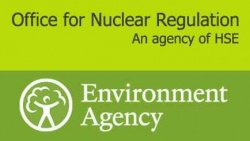Environment Agency
The Environment Agency was set up in 1996 covering England and Wales but in 2013 became an England-only non-departmental public body of the Department for Environment, Food and Rural Affairs.
Contents
Nuclear responsibilities

|
This article is part of the Nuclear Spin project of Spinwatch. |
The Environment Agency is 'responsible for regulating the nuclear industry on environmental matters such as disposals and discharges of radioactive waste from the site, discharges of cooling water and operation of standby generators'.
Our position on nuclear power is that we:
- recognise nuclear power's role in providing low-carbon electricity generation as part of the national energy mix
- insist that nuclear installations achieve high standards of safety, security, environmental protection and radioactive waste management
- believe that Government and the Nuclear Decommissioning Authority should continue to demonstrate credible commitment to making progress with geological disposal of radioactive waste.
Waste
Since 6 April 2010 has regulated the disposal of radioactive waste from nuclear sites under the Environmental Permitting (England and Wales) Regulations 2010 (EPR). We also regulate certain aspects of the keeping and use of radioactive sources on nuclear sites. These Regulations replace the Radioactive Substances Act 1963 (RSA93). For convenience we call this Radioactive Substances Regulation (RSR).
Generic Design Assessment
The UK's two civil nuclear regulators – the HSE and Environment Agency – have been carrying out a new process called 'Generic Design Assessment' (GDA), which looks at the safety, security and environmental implications of new reactor designs before an application is made to build that design at a particular site. [1] In March 2008, the initial assessment of four nuclear power station designs was completed. No shortfalls in any of the four designs were found. A series of reports on each design were published. [2]
The next stage was going to be a prioritisation process to select a maximum of three reactor designs to proceed to the next stage of the assessment, but Atomic Energy of Canada Ltd announced in April 2008 that it was pulling its ACR-1000 design out of the process to focus on its home market. [3]
On 12 June 2008, HSE and the Environment Agency announced that they were starting the next, more detailed stage of the GDA process - referred to by HSE as Step 3 - for the remaining three designs.
Then in September 2008 General Electric's nuclear venture with Hitachi Ltd. asked the HSE to temporarily halt the process of assessing its so-called Economic Simplified Boiling Water Reactor so that it could focus its efforts on getting U.S. approval instead. [4]
This left only the Toshiba-Westinghouse AP1000 design and the Areva-Siemens European Pressurised Water Reactor (EPR) in the assessment process.
At the end of the process the regulators will make statements setting out their conclusions about the acceptability of the designs.
Updates from the HSE on the process are on its GDA Reports webpage.
Regulating the shale gas industry
In a written answer to Maria Eagle MP in April 2014 about how many Environment Agency staff were working on'the regulation of fracking in England and Wales; and what reductions in the budget of the Environment Agency have affected people working on that regulation.'
Dan Rogerson replied:
- The Environment Agency has set up a team of 10 national officers working full time to develop the regulatory regime for oil and gas activities. This work covers conventional and unconventional oil and gas activities. This team is supported by additional technical resource from elsewhere in the organisation. The workload fluctuates and these specialists are not solely dedicated to regulating and permitting unconventional activities. It is therefore not possible to give an exact answer, but the agency estimates that approximately 40 further members of staff are currently involved in this work across England.
- UK Government policy is to ensure the shale industry is able to develop in a safe, sustainable and environmentally responsible way within a well-regulated environment. Regulating the industry will remain a priority for the Environment Agency. Funding for setting up the regulatory regime comes from DEFRA grant in aid. Work to regulate individual sites is financed through the charges the Environment Agency raises for environmental permits and licences, supported where necessary by the grant in aid.
People
- Dr Paul Leinster - CEO
Former people
- Lord Chris Smith - chairman
Contact
- Website:
Resources
Notes
- ↑ See UK Nuclear Regulators: Nuclear Reactor Assessment HSE website accessed December 2008.
- ↑ Generic Design Assessment Reports, HSE website, accessed December 2008.
- ↑ T.Hamilton,'AECL abandons effort to sell UK reactors' Toronto Star, 5 April 2008.
- ↑ L.Paulsson, 'GE asks UK to suspend approval of nuclear reactor' Bloomberg, 17 September 2008.
